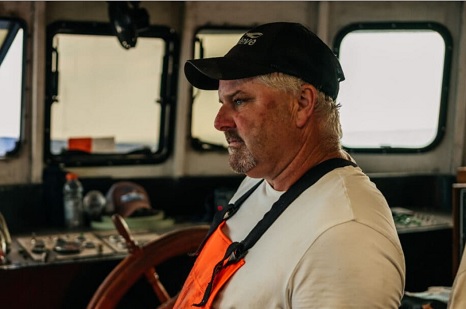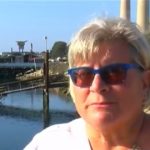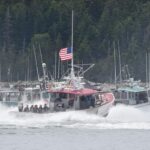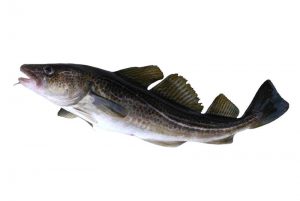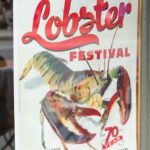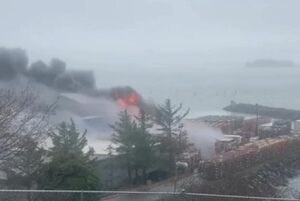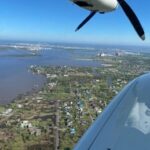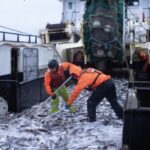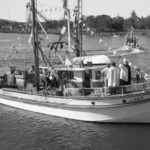A loose coalition of offshore wind opponents is forming from North Carolina to New England to the Great Lakes to question or challenge the expanding list of proposed projects. The Thomas Jefferson Institute for Public Policy has affiliated with the coalition, with our concerns over Dominion Energy Virginia’s proposed 5,280 megawatt project basically being economic. Massive worldwide economic forces are behind this push, most of them positioning the company to earn substantial profits from energy ratepayers. The Virginia State Corporation Commission, basically under orders from the General Assembly to approve the offshore wind proposed by Dominion, has estimated the all-in consumer cost of the Dominion project at more than $37 billion. It accounts for about a third of the $807 annual increase in residential electric bills the SCC has projected by 2030, with the power provided dependent on unreliable wind. >click to read< 11:55
Tag Archives: Great Lakes
Will offshore wind ever come to the Great Lakes?
 Wind turbines in the Great Lakes have the potential to produce huge amounts of clean energy in one of the most populated regions in North America. But offshore wind has been banned by a moratorium in Ontario since 2011 and faces headwinds in the U.S. Still, the Ontario Clean Air Alliance thinks it’s time to reconsider, arguing offshore wind could end the province’s reliance on natural gas imports from the U.S. for its gas-powered generators at a time when the U.S. threatens Canada with punishing tariffs and talk of annexation. “Given that we’re in a sovereignty crisis and affordability crisis and a climate crisis,” said Jack Gibbons, the group’s chair, “this is a solution that can address all three of those crises and we should just be moving forward as quickly as possible.” Videos, photos, more, >>CLICK TO READ<< 08:20
Wind turbines in the Great Lakes have the potential to produce huge amounts of clean energy in one of the most populated regions in North America. But offshore wind has been banned by a moratorium in Ontario since 2011 and faces headwinds in the U.S. Still, the Ontario Clean Air Alliance thinks it’s time to reconsider, arguing offshore wind could end the province’s reliance on natural gas imports from the U.S. for its gas-powered generators at a time when the U.S. threatens Canada with punishing tariffs and talk of annexation. “Given that we’re in a sovereignty crisis and affordability crisis and a climate crisis,” said Jack Gibbons, the group’s chair, “this is a solution that can address all three of those crises and we should just be moving forward as quickly as possible.” Videos, photos, more, >>CLICK TO READ<< 08:20
Sea lamprey control program receives OK to rehire federal workers, after initial scare
 The Great Lakes’ Sea lamprey control program has the OK to rehire three dozen federal employees it needs to combat the eel-like, invasive fish species. That’s after staffing cuts and hiring freezes from the Trump administration last month threatened the work, which the Great Lakes Fishery Commission said would have led to more than $200 million in lost fishing potential. The Great Lakes Fishery Commission is a Canadian American commission which coordinates lamprey control across the Great Lakes region. Each year, the commission contracts workers with the U.S. Fish and Wildlife Service to set traps and apply lampricide in rivers, stopping lamprey before they enter the Great Lakes. more, >>CLICK TO READ<< 10:40
The Great Lakes’ Sea lamprey control program has the OK to rehire three dozen federal employees it needs to combat the eel-like, invasive fish species. That’s after staffing cuts and hiring freezes from the Trump administration last month threatened the work, which the Great Lakes Fishery Commission said would have led to more than $200 million in lost fishing potential. The Great Lakes Fishery Commission is a Canadian American commission which coordinates lamprey control across the Great Lakes region. Each year, the commission contracts workers with the U.S. Fish and Wildlife Service to set traps and apply lampricide in rivers, stopping lamprey before they enter the Great Lakes. more, >>CLICK TO READ<< 10:40

St. Bernard couple’s shrimp boat takes them on a 5-month, 6,000-mile journey around Great Loop
If this were a romantic comedy, it would be called “Tracy and Stacie’s Big Adventure.” If it were a seafaring adventure novel, the title could be “Around the Loop in 125 Days.” Whatever you call it, the five-month nautical journey that St. Bernard residents Tracy and Stacie Alfonso recently completed was the trip of a lifetime. Now the couple is home and their shrimp boat docked once again at Delacroix Island after completing the 6,000-mile Great Loop. Tracy Alfonso, who grew up in a commercial fishing family and shrimped all of his life, had dreamed of navigating the Great Loop since he heard about it. Called the greatest boat adventure in North America, the journey entails circumnavigating much of the United States and parts of Canada. Photos, more, >>CLICK TO READ<< 13:03
Scientists at U.S. weather forecasting agency ordered to get clearance before talking to Canadian counterparts
 Travelling for international meetings or even joining a call with Canadian counterparts has become impossible for some U.S. government scientists, under new directives since U.S. President Donald Trump took office. Canadian ecologist Aaron Fisk says he recently tried to set up a virtual call to discuss plans with American colleagues, including a government scientist, around sampling fish. “We tried to have a quick meeting with one of our collaborators … and they were denied access,” Fisk said. Given that the Great Lakes — and their aquatic life — straddle both sides of the border, having American scientists suddenly barred from meetings has had deep impacts. That, combined with funding freezes, is drastically altering the way science works in North America, at least for now. Fisk, who is the Canada Research Chair in Changing Great Lakes Ecosystems at the University of Windsor, receives funding from the U.S. National Oceanic and Atmospheric Administration (NOAA) for his work. more, >>CLICK TO READ<< 19:44
Travelling for international meetings or even joining a call with Canadian counterparts has become impossible for some U.S. government scientists, under new directives since U.S. President Donald Trump took office. Canadian ecologist Aaron Fisk says he recently tried to set up a virtual call to discuss plans with American colleagues, including a government scientist, around sampling fish. “We tried to have a quick meeting with one of our collaborators … and they were denied access,” Fisk said. Given that the Great Lakes — and their aquatic life — straddle both sides of the border, having American scientists suddenly barred from meetings has had deep impacts. That, combined with funding freezes, is drastically altering the way science works in North America, at least for now. Fisk, who is the Canada Research Chair in Changing Great Lakes Ecosystems at the University of Windsor, receives funding from the U.S. National Oceanic and Atmospheric Administration (NOAA) for his work. more, >>CLICK TO READ<< 19:44
Biden’s missed chance to safeguard America’s oceans
 Among President Biden’s many laudable environmental accomplishments, one of his historic failures is that he declined to protect America’s ocean ecosystems. Despite the president’s professed goal to protect 30 percent of America’s oceans by 2030, he did virtually none of this. Perhaps he was planning on a second term (obviously a bad gamble), or perhaps he never really intended to do any of this. Regardless, the hope and optimism for ocean protection at the beginning of the Biden administration has, in the end, turned to profound disappointment. On this issue, the administration prioritized local politics over science, need and national interest. more, >>CLICK TO READ<< 07:29
Among President Biden’s many laudable environmental accomplishments, one of his historic failures is that he declined to protect America’s ocean ecosystems. Despite the president’s professed goal to protect 30 percent of America’s oceans by 2030, he did virtually none of this. Perhaps he was planning on a second term (obviously a bad gamble), or perhaps he never really intended to do any of this. Regardless, the hope and optimism for ocean protection at the beginning of the Biden administration has, in the end, turned to profound disappointment. On this issue, the administration prioritized local politics over science, need and national interest. more, >>CLICK TO READ<< 07:29
“THE FISH THIEF: A Great Lakes Mystery”
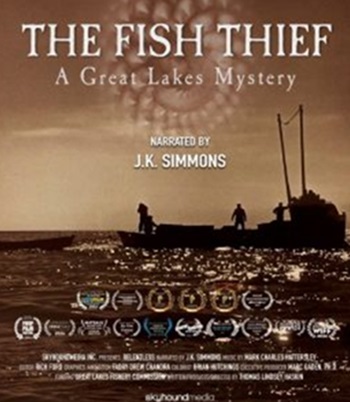 “THE FISH THIEF,” narrated by Oscar-winning actor J.K. Simmons, delves into the extraordinary effort to uncover the cause of a devastating environmental crisis. Was it overfishing, pollutants, or something else? Scientists on both sides of the border worked tirelessly to solve the mystery. In a dramatic eleventh-hour breakthrough, they discovered the true culprit: the invasive sea lamprey. This notorious predator arrived in the Great Lakes in the early twentieth century, triggering an ecological crisis and nearly wiping out populations of lake trout, whitefish, and other cornerstone species. The impact reverberated across the region, ruining local industries, damaging small town economies and indigenous communities, and destroying the livelihoods of people on both sides of the U.S. and Canadian border. A dedicated group of international scientists, policymakers, and conservationists banded together in a race against time to address this ecological invasion. more, >>CLICK TO READ<< 10:42
“THE FISH THIEF,” narrated by Oscar-winning actor J.K. Simmons, delves into the extraordinary effort to uncover the cause of a devastating environmental crisis. Was it overfishing, pollutants, or something else? Scientists on both sides of the border worked tirelessly to solve the mystery. In a dramatic eleventh-hour breakthrough, they discovered the true culprit: the invasive sea lamprey. This notorious predator arrived in the Great Lakes in the early twentieth century, triggering an ecological crisis and nearly wiping out populations of lake trout, whitefish, and other cornerstone species. The impact reverberated across the region, ruining local industries, damaging small town economies and indigenous communities, and destroying the livelihoods of people on both sides of the U.S. and Canadian border. A dedicated group of international scientists, policymakers, and conservationists banded together in a race against time to address this ecological invasion. more, >>CLICK TO READ<< 10:42
After a dramatic decline, lake trout have recovered in most of Lake Superior
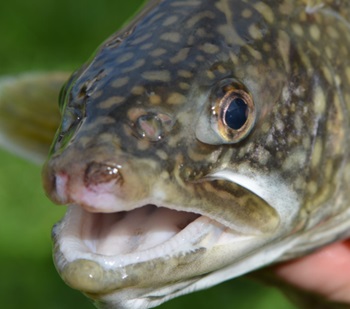 After decades of work, fishery managers say lake trout have fully recovered in most of Lake Superior after the invasive, fish-killing sea lamprey decimated their numbers. The Lake Superior Committee of the Great Lakes Fishery Commission, which is made up of state, tribal and Canadian natural resource managers, announced the population’s recovery Wednesday. The lake trout population in Lake Superior dropped to dramatically low levels during the mid-1900s due to overfishing and an invasion of sea lampreys, eel-like parasites that suck the blood of their hosts. The parasitic fish spread to the Great Lakes from the Atlantic Ocean, invading Lake Superior by 1938. more, >>CLICK TO READ<< 11:03
After decades of work, fishery managers say lake trout have fully recovered in most of Lake Superior after the invasive, fish-killing sea lamprey decimated their numbers. The Lake Superior Committee of the Great Lakes Fishery Commission, which is made up of state, tribal and Canadian natural resource managers, announced the population’s recovery Wednesday. The lake trout population in Lake Superior dropped to dramatically low levels during the mid-1900s due to overfishing and an invasion of sea lampreys, eel-like parasites that suck the blood of their hosts. The parasitic fish spread to the Great Lakes from the Atlantic Ocean, invading Lake Superior by 1938. more, >>CLICK TO READ<< 11:03
Long-sought-after shipwreck with tragic history discovered at popular Lake Michigan fishing spot over a century later
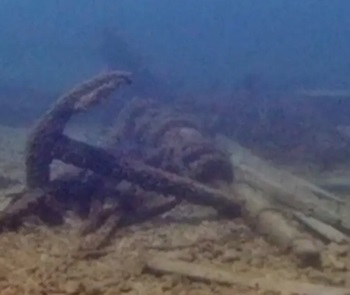 An intrepid team of marine archaeologists has discovered the wreckage of a long-sought-after schooner, more than a century after it sunk beneath Lake Michigan. The Margaret A. Muir was found 50 feet below the surface several miles off the coast of Algoma, Wisconsin in May, the Wisconsin Underwater Archaeology Association announced this month. “The Margaret A. Muir was lost to history” in the last 130 years since, despite its relatively close proximity to shore, according to the experts. “It had lay undetected for over a century, despite hundreds of fishing boats passing over each season.” Photos, >>CLICK TO READ<< 08:45
An intrepid team of marine archaeologists has discovered the wreckage of a long-sought-after schooner, more than a century after it sunk beneath Lake Michigan. The Margaret A. Muir was found 50 feet below the surface several miles off the coast of Algoma, Wisconsin in May, the Wisconsin Underwater Archaeology Association announced this month. “The Margaret A. Muir was lost to history” in the last 130 years since, despite its relatively close proximity to shore, according to the experts. “It had lay undetected for over a century, despite hundreds of fishing boats passing over each season.” Photos, >>CLICK TO READ<< 08:45
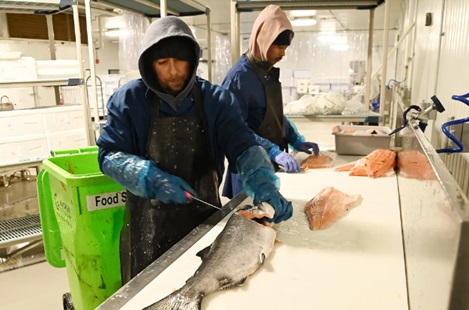
Fish skin, scales touted as future economic boon for Mich., Great Lakes
The fillets that depart Motor City Seafood Co. are tidy, ready to be packaged, shipped and prepared fresh at a Metro Detroit kitchen. They don’t start that way. The Highland Park seafood distributor mostly imports whole fish. Workers fillet them by hand or send them through a system of machines that remove the scales, heads, organs and bones before they are skinned and packed away. Motor City Seafood is left with packages of carefully cut fillets and a big green bucket of the rest — skin, scales, heads, guts. While unsightly when piled in the bucket, those offcuts could be a wellspring for the region’s commercial fish industry. more, >>click to read<< 07:14
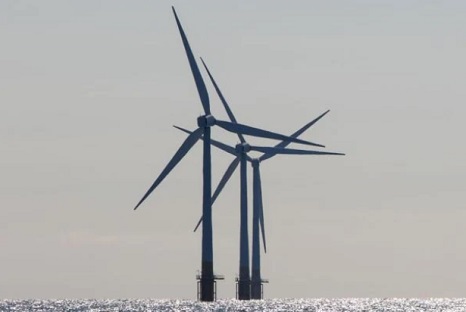
Commercial Fishers Say Biden Admin’s ‘Ocean Justice’ Initiative Totally Ignores Their Concerns
The Biden Administration announced the “ocean justice” strategy in December 2023 during the United Nations (UN) climate summit, known as COP28, in order “to advance environmental justice for communities that rely on the ocean and Great Lakes for economic, cultural, spiritual, recreational and food security purposes.” However, several stakeholders in the commercial fishing industry who depend on the fruits of America’s waters to make a living and are therefore interested in sustainable use of the oceans, say that the administration is overlooking their concerns about how the oceans are managed, especially with regard to the administration’s extensive efforts to fast track industrial scale offshore wind. more, >>click to read<< 10:19
Euclid Fish Co. pledges to use 100 percent of Great Lakes fish caught
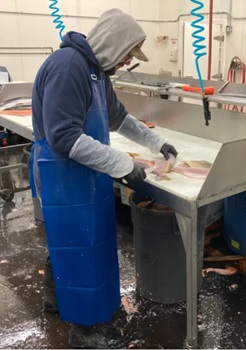 A Mentor-based company has made a commitment to increasing the value and usefulness of fish caught in the Great Lakes. Euclid Fish Co. has signed on to the “100 percent Great Lakes Fish Pledge,” publicly committing to using 100 percent of each commercially caught Great Lakes fish productively by 2025, according to a corporate news release. As part of the pledge, Euclid Fish will explore and implement innovative applications for fish byproducts including fertilizer, protein, marine collagen, leather and other new, high-value products. According to the release, the Great Lakes are home to a sizeable commercial fishery, but only the fillets of these fish are usually eaten while the remaining 60% of the fish is relegated to inexpensive animal feed or discarded. more, >>click to read<< 09:34
A Mentor-based company has made a commitment to increasing the value and usefulness of fish caught in the Great Lakes. Euclid Fish Co. has signed on to the “100 percent Great Lakes Fish Pledge,” publicly committing to using 100 percent of each commercially caught Great Lakes fish productively by 2025, according to a corporate news release. As part of the pledge, Euclid Fish will explore and implement innovative applications for fish byproducts including fertilizer, protein, marine collagen, leather and other new, high-value products. According to the release, the Great Lakes are home to a sizeable commercial fishery, but only the fillets of these fish are usually eaten while the remaining 60% of the fish is relegated to inexpensive animal feed or discarded. more, >>click to read<< 09:34
‘Catalytic.’ How a bipartisan bill could save working waterfronts from Cape Cod to Alaska
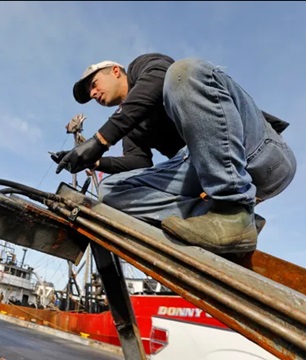
Andrew Spalt climbs the side of the new hydraulic dredge ramp he is installing aboard his boat Miss Emma.
The Working Waterfront Protection Act (S-3180) would establish a grant program that would support working waterfronts in coastal states, including the Great Lakes. The act would provide $20 million annually through fiscal 2028. Commercial fishing cooperatives, working waterfront owners and operators, nonprofit organizations and municipal and state governments would be eligible to apply. Fishing Communities Coalition Coordinator Noah Oppenheim said support is crucial because of pressures facing working waterfront owners and fishing communities nationwide. The coalition represents more than 1,000 independent small boat fishermen and business owners from Maine to Alaska, according to its website. 8 photos, more, >>click to read<< 09:38
William R. Miller: Why don’t we restore commercial fishing in Erie?
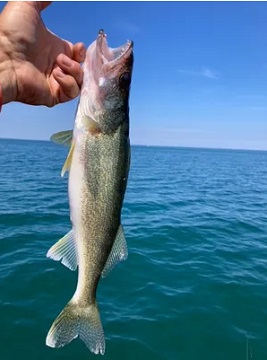 There are two kinds of jobs, those that “create wealth” by bringing money into the region from outside the region and those jobs that “circulate wealth” within the region. Fish we take from the lake, crops that we grow, minerals that we extract from the ground, products that we manufacture, retirees we convince to live here, services provided to outside individuals and organizations, and tourists who we attract, all create wealth for the region. Each wealth-creation job typically supports about three wealth-circulating job in the region. We’ll focus here on one potential source for wealth-creating jobs. In 1890, Erie was the largest, in tonnage, freshwater fishing port in the entire world. Today, my understanding is that Erie is down to one commercial fisherman and the Canadian Great Lakes fishing industry is now about a $1 billion industry. What happened? >click to read< 15:45
There are two kinds of jobs, those that “create wealth” by bringing money into the region from outside the region and those jobs that “circulate wealth” within the region. Fish we take from the lake, crops that we grow, minerals that we extract from the ground, products that we manufacture, retirees we convince to live here, services provided to outside individuals and organizations, and tourists who we attract, all create wealth for the region. Each wealth-creation job typically supports about three wealth-circulating job in the region. We’ll focus here on one potential source for wealth-creating jobs. In 1890, Erie was the largest, in tonnage, freshwater fishing port in the entire world. Today, my understanding is that Erie is down to one commercial fisherman and the Canadian Great Lakes fishing industry is now about a $1 billion industry. What happened? >click to read< 15:45
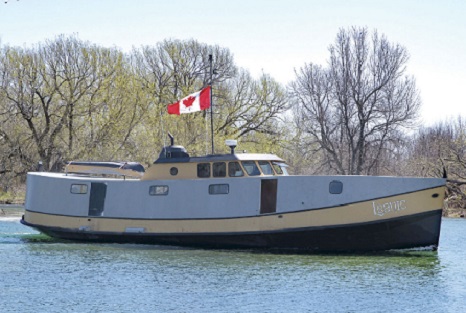
Master of the Leanic: Tim McCormack continues a tradition going back five generations
For Tim McCormack, life doesn’t get any better than being out on the lake in his fishing boat, the Leanic. He says that it’s his “happy place”. “I’ve been doing this since I was knee-high to a grasshopper,” he said. “My father was a fisherman and on my mother’s side my grandfather Mel McIntosh was a fisherman, and his grandfather David McIntosh was one of the first commercial fishermen in this area.” Tim learned the trade and the secrets of the lake from his father and grandfather, and he provided an analogy for his knowledge of the lake that is a little too colourful to print in a family newspaper. Now, he is passing that generational knowledge along to his son, Jordan, who is just a couple of exams away from obtaining his Captain’s licence. >click to read< 11:16

From Wheatley: Voyage to the bottom of the sea (Part 1)
I came to be speaking with Doug Johnston in the net repair room of Johnston Net and Twine, the shop, on County Road 3 on the east side of Wheatley, that Doug co-owns with his son, Rob. Doug has been in the Lake Erie commercial fishing industry for 67 of his 79 years. Of those, Doug was on Lake Erie for 34 years, and for about four years on Lake Huron, as a deckhand, and then captain and boat owner. To this day, he co-owns, with his son Rob, the Dorothy J – a 68-foot, 300-horsepower Lake Erie fish tug built in 1957 at Dunnville on the Grand River.Like most people who make their living in the commercial fishing industry, Doug has seen a lot of things: years when fish were plentiful, years when it seemed they had vanished; spectacular sunrises on smooth-as-glass water; and terrifying storms and fellow-fishermen lost and rescued. >click to read< 10:06
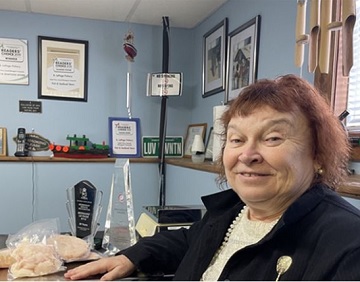
‘There’s no future in it’: Parry Sound commercial fishers given ever-decreasing catch limits
Earlier this year, the Ministry of Natural Resources and Forestry announced it was “modernizing” the commercial fishery, including a move toward fishers digitally reporting their daily catch. “They just keep taking (our quota) away,” said Sandra LePage of Nobel, who owns B. LePage Fishery with her husband, Bernie, (whose father founded the famous fish restaurant Henry’s). In 2018, the LePage Fishery was allowed to harvest 34,559 pounds of whitefish; that has dropped annually. Now, for 2023, they are allowed to harvest 20,470 pounds. For lake trout, the max was 8,128 pounds in 2018, and for 2023, it is 4,894 pounds. Commercial fisher Bill Kalwaski, who is based out of Byng Inlet, said that when the lake trout population is high, the whitefish population is down, and “without the whitefish, there is no commercial fishery in the upper great lakes,” >click to read< 18:30
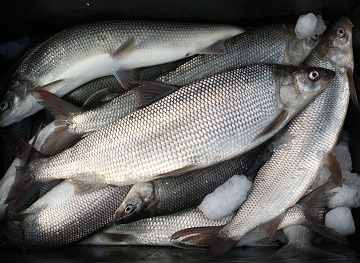
The Great Lakes-Iceland connection through the 100% Whitefish effort
While Great Lakes fish populations are constantly in a state of flux, one species has declined precipitously in the last decade: lake whitefish. But Great Lakes leaders and fisheries managers are looking ahead in planning to do more with less. And in the case of whitefish, a lot more. The search for a way to preserve an industry with a shrinking natural resource brought the Iceland Ocean Cluster (IOC) into focus. IOC was founded by Thor Sigfusson in 2012 with a dozen companies on-site. There are now 70. So, what is it? And could it work as a model for the Great Lakes’ new whitefish initiative? >click to read< 17:09
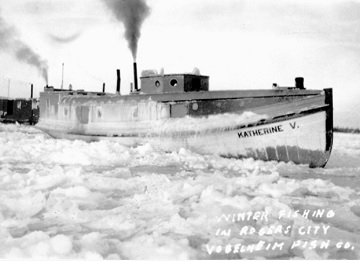
‘Follow the Fish’ to learn about tugs at GLMHC on Thursday
“Follow the Fish” to learn about the evolution of commercial fishing vessels in the Great Lakes. Thunder Bay National Marine Sanctuary Maritime Archaeologist Cassandra Sadler will examine the historical development of the traditional Great Lakes commercial fish tug. “Fish tugs and fishing vessels were immensely important to the Great Lakes fishing industry,” Sadler said. “There aren’t many of the fish tugs left … there’s only a handful of active commercial fish tugs, and many are in museums. So, we’re just trying to document them before they all disappear.” Photos, >click to read< 08:28
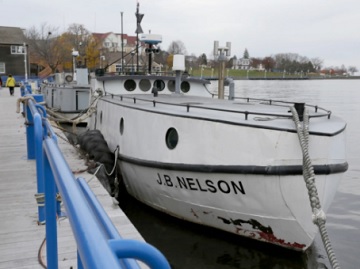
Sheboygan history: Fishing boats from yesterday and today in photo’s
The J.B. Nelson is docked at the Sheboygan riverfront, Saturday, November 20, 2021, in Sheboygan, Wis. According to Harvey Hadland’s online history of fishing vessels of the Great Lakes, the J.B. Nelson was built by Burger Boat Co. in 1937 for Leonard A. Nelson, Sturgeon Bay, Wis. The 40 ft. x 11 ft. all steel vessel was equipped with a 45-54 hp. Kahlenberg oil engine. In 1981 ownership went to another Nelson, Mark Nelson, in Sheboygan, Wis. The boat’s power plant has been replaced with a Cummins diesel. 12 photos, >click to read< 16:13
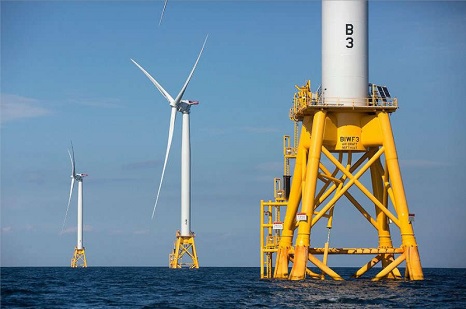
Why Offshore Wind Farms Face Lawsuits – The American Coalition for Ocean Protection
Nantucket residents have filed a landmark lawsuit over federal approval of Vineyard Wind, the first industrial scale offshore wind project in the U.S. Federal law protects existing ocean uses: commercial fishing, vessel traffic, the viewshed, and endangered species from new energy projects. Since federal approvals of all offshore wind projects will likely use the same flawed process, a court win for this lawsuit may stop all the projects. Specifically, Ackrats is the group filing the complaint and is concerned about Vineyard Wind’s negative impact on the North Atlantic right whale, “one of the most critically endangered species on the entire planet.” Those Nantucket residents are not alone. Beach communities from North Carolina to Maine and the Great Lakes joined together to form the American Coalition for Ocean Protection. >click to read< 16:13
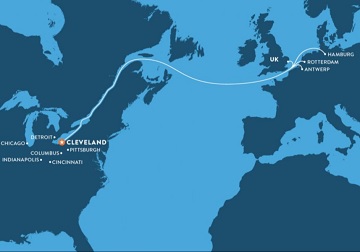
Shipping container traffic making waves on St. Lawrence/Great Lakes system
On Monday, the container ship Peyton Lynn C, which loaded in Antwerp, Belgium, passed through the locks in Massena and Iroquois, Ontario, on her way upriver on the St. Lawrence heading for the Great Lakes. In her wake, her owners believe, may be a new era in regards to a shipping method for the international waterway. Industry experts say that about 90% of non-bulk cargo worldwide is transported by container ships, with large coastal ports along the Atlantic and Pacific oceans the hubs of that activity. But the container vessel business model has begun to create ripples in the St. Lawrence and Great Lakes. photos, >click to read< 18:19

Opposition Forms from N.C. to N.E. to Great Lakes over ocean industrial development all-in consumer cost
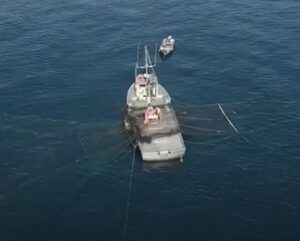
Inland Fisheries: A big fight in Lansing over fishing rules on the Great Lakes
Dana Serafin still hauls in 20,000-pound boatloads of whitefish to supply regional restaurants and markets, Native whitefish, the main livelihood for Serafin and other Great Lakes commercial fishermen, have been in decline for years amid changes to the food web, replaced in Serafin’s nets by healthier populations of walleye and lake trout that he’s not allowed to keep. Chinook salmon, once a favorite of recreational anglers on lakes Michigan and Huron, have also plummeted in Lake Michigan, and all but disappeared from Lake Huron. Battles are brewing over fishing rights from recreational, commercial, Native American, and environmental group meddling. Video, >click to read< 13:41
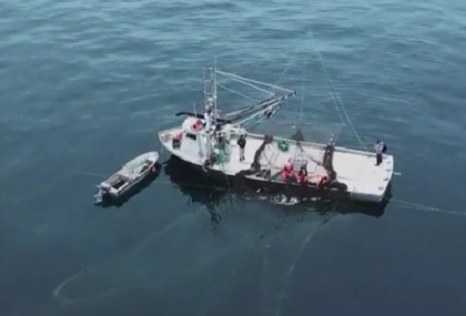
Federal Relief: Great Lakes fisheries finally get a cut of Coronavirus relief funds
After being snubbed in 2020, the folks who make their living by fishing the Great Lakes – both commercially and for sport – have been included in the latest round of federal relief from the economic ravages of COVID-19.,, Neither group was included in the massive Coronavirus Aid, Relief, and Economic Security Act that passed in March 2020, even though $300 million was specifically earmarked for U.S. fisheries.,, Getting the Great Lakes included in CRRSA was just the beginning. Now comes the harder work of figuring out how to access the money. Video, >click to read< 16:10
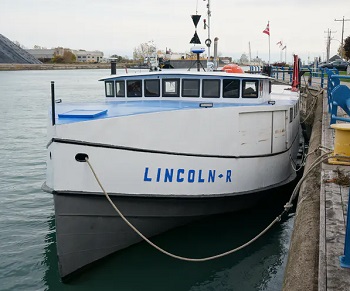
Family owned working waterfront fishing businesses displaced by waterfront developments on Great Lakes
For three generations, the Minor family, today brothers Carson and Landon and their father Paul, have been up before first light to board their fishing tug and make their way to their fishing grounds on Lake Erie. Most mornings, the Minors leave from Port Colborne, Ont., Each afternoon they return to the port to unload their fresh catch of perch and pickerel.,, Without warning, the unloading zone their family had used for more than 70 years was blocked off. They were forced to move to a new port further away from their fishing grounds, increasing travel time and putting them at greater risk during bad weather.,, The Minors’ story is not new, nor is it isolated. Working waterfront access is being affected by coastal gentrification, also called “coastal grabbing” >click to read< 16:47
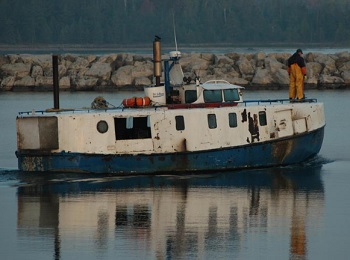
Congress gave $300 million to help fisheries. The Great Lakes got zero. Why were they left out?!
The nationwide shutdown was especially ill-timed for fishers in the Great Lakes. “We had reports of commercial fishermen in Michigan who had a catch with absolutely nowhere to sell it,” Luckily, there was a plan in place to help commercial fishers and charter boats. But when it came time to distribute that funding, most of the Great Lakes states were left out altogether. That came as a shock to many fishers. “Right up until the final hour, a lot of the Great Lakes fishery participants thought that they were going to be included,” says Gravelle. Why the Great Lakes were left out? >click to read< 14:53
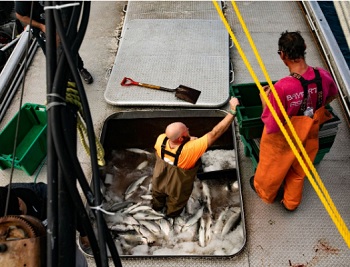
Commercial fishing sails into final chapter
The final nail in the coffin? According to the news, the traditional mom-and-pop style operations would move out of the Great Lakes for good, and leave the door open only for large, investor-style operations to take over the industry. “What it does, it finally just chokes us out,” said Amber Peterson, operator of The Fish Monger’s Wife, one of the remaining commercial fisheries. “It doesn’t even offer us the dignity of a quick death.” >click to read< stories related to this post, >click here< 10:15

Offshore Wind Farms are new danger for Lake Erie through Governor Cuomo’s Green New Deal
The proposal to install offshore wind turbines on the Eastern side of Lake Erie was brought to my attention during the annual Woodlawn Beach cleanup last September. Since then I have learned much about how negative this would be for Lake Erie and the people and wildlife that depend on it, the protests around the world against these types of projects and the media paywalls that are stifling our knowledge of them. Global developers have called the Great Lakes the “Saudi Arabia of Wind,” and surprisingly, the Sierra Club and other environmental groups that oppose Peace Bridge reconstruction and shoreline development endorse the turbines. Can you see the dollar signs? Can you trust a global industry with our fresh water? By Mary Henson, >click to read< 14:22
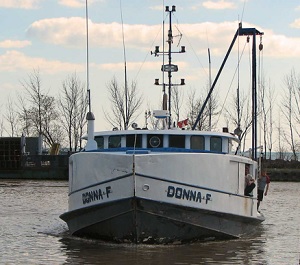
Commercial Fisherman lost in Lake Erie after going overboard
Divers from the OPP are searching Lake Erie for a man who is missing after going overboard from a commercial fishing vessel Monday morning. The incident happened about 13 kilometres west of Long Point around 10:15 a.m. The fisherman is being identified as Michael Smith, of Port Dover, Ontario from the fishing tug Donna F. “He was loved by all and had an amazing number of friends amongst the fishermen and Port Doverites alike,” photo, boatnerd.com >click to read< 19:11






